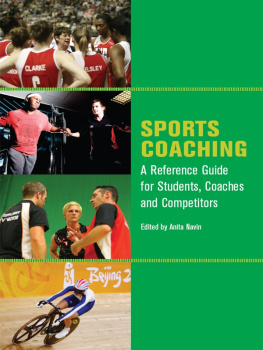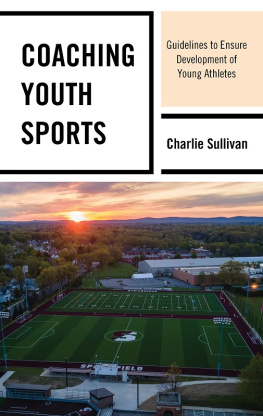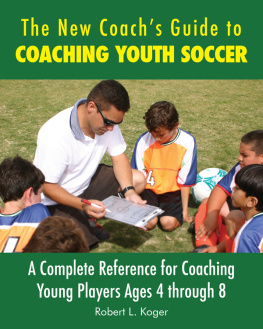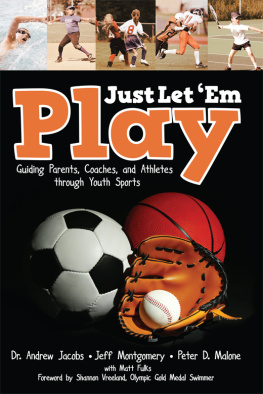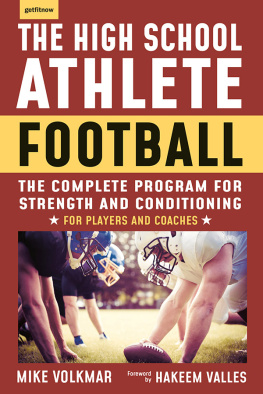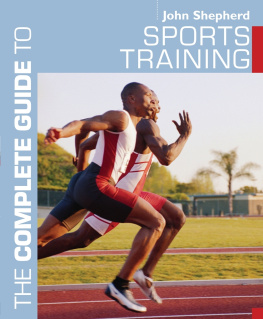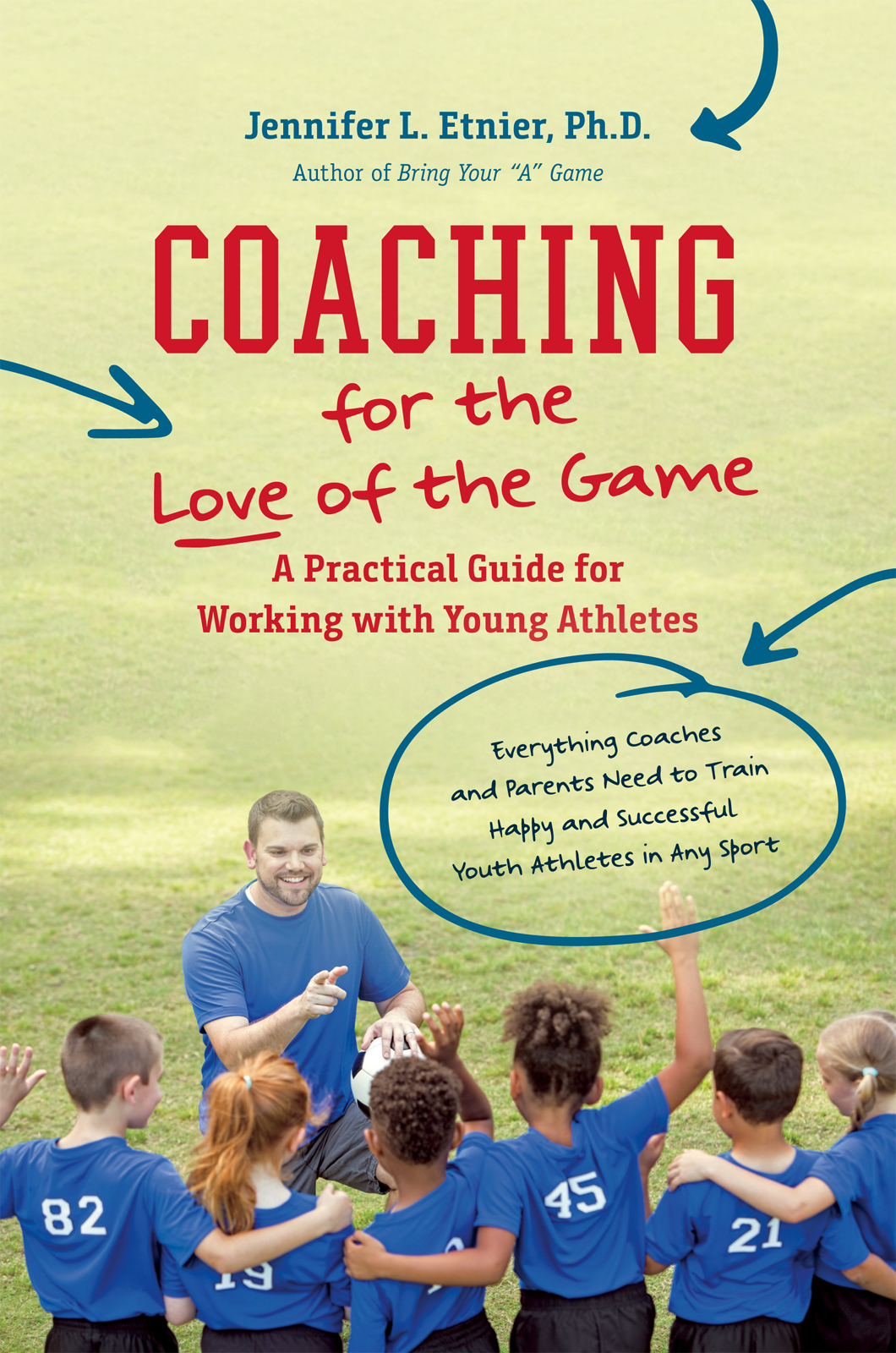Coaching for the Love of the Game
A Practical Guide for Working with Young Athletes
Jennifer L. Etnier, Ph.D.
THE UNIVERSITY OF NORTH CAROLINA PRESS
Chapel Hill
2020 The University of North Carolina Press
All rights reserved
Cover illustration: iStockphoto.com/kali9
Sports icons in studiogstock
All figures and tables were created by the author unless otherwise noted.
Designed by Jamison Cockerham
Set in Scala, Strangeways, Bunday Slab, and College by Rebecca Evans
Manufactured in the United States of America
The University of North Carolina Press has been a member of the Green Press Initiative since 2003.
LIBRARY OF CONGRESS CATALOGING-IN-PUBLICATION DATA
Names: Etnier, Jennifer L., author.
Title: Coaching for the love of the game : a practical guide for working with young athletes / Jennifer L. Etnier.
Description: Chapel Hill : The University of North Carolina Press, 2020. | Includes index.
Identifiers: LCCN 2019032092 | ISBN 9781469654829 (cloth) | ISBN 9781469654836 (paperback) | ISBN 9781469654843 (ebook)
Subjects: LCSH: Coaches (Athletics)United States. | Exercise for youthUnited States. | Leadership.
Classification: LCC GV711 .E86 2020 | DDC 796.07/7dc23
LC record available at https://lccn.loc.gov/2019032092
To the millions of youth athletes playing for the love of the game, and to the coaches, administrators, and officials who are dedicated to fostering that love.
CONTENTS
COACHING
for the Love of the Game
INTRODUCTION
The Why of This Book
So, you have this book on coaching in hand, and now you might be wondering why anyone would write such a book and why you need to read it. Let me start with the second why first. Why do you need to read this book? Because you are a youth sports coach. As a youth sports coach, you have the opportunity to impact children in ways that will stay with them for the rest of their lives. And you have the chance right now to make sure that those impacts are positive rather than negative. What kind of a coach do you want to be? If you want to be a great coach, then its not about your win/loss record. To be a great coach, your goals must extend well past the field, gym, court, or pool. Being a great coach goes way beyond drills, scrimmages, and play callsthats the easy stuff. Being a great coach requires that you meet the athletes where they are, that you treat them as the special and unique individuals that they are, and that you put their development as people above all else when you are working with them. You need this book to give you the tools to have a positive, long-lasting effect on your athletes. Your young athletes are incredibly special. They are developing rapidly in terms of their physical abilities, their cognitive skills, and their social acumen. And your athletes parents have entrusted you, as their coach, to nurture them and to foster their development within the trappings of your sport. When the athletes come to you, they will be excited to learn and to have fun. But they will also be looking to you as one of the adults in their world who can teach them to navigate the many changes they are experiencing as they grow toward adulthood. They are looking for more than the Xs and Os of the sport. They are looking for role modeling, fair treatment, a positive attitude, and unwavering support. They will call you Coach, and that title carries with it both enormous responsibility and unlimited opportunity. As Spider-Mans uncle Ben says, With great power comes great responsibility. This quote epitomizes what it means to be a coach. Youve taken on the mantle of being a youth sports coachso it is critical that you wield your powerful influence responsibly. This book will help you live up to the title of Coach by ensuring that your athletes have a positive sports experience, develop as individuals, and grow to love the game.
KEY QUOTE The Power of a Youth Sports Coach
With great power comes great responsibility.
SPIDER-MANS UNCLE BEN
I have written this book to serve as your go-to resource for the most critical aspects of your role as a coach. This book is written for you if you are a first-time volunteer coach, but it is also written for you if you are a paid coach who has been involved in youth sports for years. It is written for recreational coaches, competitive coaches, and elite coaches. It is also written for officials and league administrators. If you are working with youth athletes in any setting, this book is written specifically for you, and it is designed to help you move beyond the ephemeral goals of sports success to the permanent goals of life success.
Let me also explain why I wrote this book. With three children, my family is currently knee-deep in youth sports. This has brought great joy to my partner and me as we have watched our children accomplish personal goals, develop their sports skills, enjoy competition with their friends, and take on increasing leadership roles with their teams. But on the flip side, I cannot tell you how many times I have woken up at 4 a.m. worried about the negative impact that a coachs behavior might have on a young child. Most of the time, this sleep-ending fear hasnt even been for my own child. Its been for someone elses son or daughter whom Ive seen mistreated, ignored, insulted, or demoralized by his or her coach. I lie there in the wee hours of the morning trying to figure out how to approach the coach to tactfully explain how his or her behavior is having a negative impact on the child. I have spoken to coaches in person, I have written letters, and I have sent emails, and sometimes these communications have made a difference. But one morning I woke up and realized that addressing one coach at a time is not good enough, not fast enough, and not effective enough, given the breadth of the problem. I felt like I was putting buckets under the holes in a leaky roof! By writing this book, I hope to contribute to building a new roof. My goal is to reach large numbers of coaches and other adults involved in youth sports and share knowledge regarding how to best work with youth athletes in the hopes of having a positive impact on kids across the country.
Youth Sports Today
Have you noticed that youth sports today are different from decades ago? If you head out to a park or a field near your home, you are unlikely to see a group of children playing sports in an informal way. There is probably no pickup basketball, Wiffle ball, capture the flag, kick-the-can, or hide-and-seek being played near you. If children are outside and active, you will notice right away that they are typically involved in organized sports under the guidance of their adult coaches and with their parents, family, and friends as spectators.
Clearly, sports have changed dramatically from an activity that children used to enjoy in free play settings to a formal, structured, organized activity that cannot operate without adult involvement. In fact, youth sports have come to be viewed as an early training ground for elite-level athletes, and coaches at all levels have fallen into the trap of thinking that winning is what matters in youth sports. You may think Im crazy, but the honest truth is that winning doesnt matter one bit in youth sports. There, I said it out loud, and I would scream it from the mountaintops. WINNING DOESNT MATTER IN YOUTH SPORTS! What matters is that the athletes have positive experiences, improve their skills, have fun, learn to work hard, and develop as individuals. And the counterintuitive point here is that if athletes do all of these things, the chances of winning increase. So, its not the winning per se that matters. Winning matters only to the extent that we let it matter to the athletes. It is our interpretation of winning that influences how our athletes learn to deal with both winning and losing. As a youth sports coach, you play a pivotal role in terms of affecting the experiences of your athletes, and that is why you need this book.


